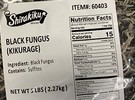CDC, public health and regulatory officials in several states, and the U.S. Food and Drug Administration (FDA) are investigating a multistate outbreak of Salmonella Stanley infections linked to wood ear mushrooms (also commonly known as kikurage or dried fungus).
Do not eat, sell, or serve recalled dried wood ear mushrooms distributed from Wismettac Asian Foods, Inc. These mushrooms were sold only to restaurants and not directly to consumers.

Consumers can ask restaurants where mushrooms are from before ordering to avoid eating recalled mushrooms. Wood ear mushrooms are also commonly referred to as Kikurage, Dried Black Fungus, Dried Fungus, or Mu’er/Mu Er/Mu-Err.
Restaurant employees should check for recalled dried mushrooms and not serve or sell them. If you can’t tell where your dried mushrooms are from, throw them away.
Mushrooms were distributed to restaurants in six packs of five-pound bags labeled as Shirakiku brand Black Fungus (Kikurage) with Universal Product Code (UPC) bar code 00074410604305, item #60403, imported from China.
Clean and sanitize all surfaces that recalled mushrooms have come in contact with, including cutting boards, countertops, utensils, and storage bins.
In general, dried mushrooms should always be reconstituted using boiling water to kill any pathogens. This advice does not apply to recalled mushrooms, which should be thrown away.
For more information, click here.
